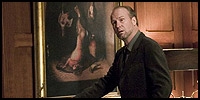
 |
|
A History of Violence (2005) Cast: Viggo Mortensen, Maria Bello, William Hurt, Ed Harris, Ashton Holmes, Heidi Hayes, Stephen McHattie, Greg Bryk, Peter MacNeill 2005 – 96 minutes Rated: Reviewed by Dustin Putman, September 21, 2005.  The adage goes that violence breeds violence. It's not a new notion, or a particularly original one, but it seems to be all that "A History of Violence" has to say. Directed by David Cronenberg (2002's "Spider") and based on the graphic novel by John Wagner and Vince Locke, the film is a pulpy "message" thriller that forgets to bring meaning to what, curiously enough, gets its only real interest from three or four graphically violent and gory sequences. They are good for a sporadic shot of much-needed adrenaline, but are just as exploitative as any gruesome R-rated shoot-'em-up.
The adage goes that violence breeds violence. It's not a new notion, or a particularly original one, but it seems to be all that "A History of Violence" has to say. Directed by David Cronenberg (2002's "Spider") and based on the graphic novel by John Wagner and Vince Locke, the film is a pulpy "message" thriller that forgets to bring meaning to what, curiously enough, gets its only real interest from three or four graphically violent and gory sequences. They are good for a sporadic shot of much-needed adrenaline, but are just as exploitative as any gruesome R-rated shoot-'em-up.
 At least something like 2005's "Assault on Precinct 13" remake had no pretensions of being anything other than the adult popcorn action movie that it was, and garnered bloody fun out of its death scenes and over-the-top gun fights. By trying, and failing, to find a point in what "A History of Violence" serves up, director Cronenberg has made a major calculated filmmaking misstep. Indeed, this latest project from one of our most offbeat and courageous cinematic artists is a lumbering, confused mess, at the level of one of those trite "...from hell" thrillers, like 2001's "Domestic Disturbance" (stepfather from hell), 2001's "The Glass House" (guardians from hell), and 1992's "The Hand that Rocks the Cradle" (nanny from hell). As well-worn as their trajectories were, that all three of those films are superior to "A History of Violence" gives one an idea of the level everyone is working on here.
At least something like 2005's "Assault on Precinct 13" remake had no pretensions of being anything other than the adult popcorn action movie that it was, and garnered bloody fun out of its death scenes and over-the-top gun fights. By trying, and failing, to find a point in what "A History of Violence" serves up, director Cronenberg has made a major calculated filmmaking misstep. Indeed, this latest project from one of our most offbeat and courageous cinematic artists is a lumbering, confused mess, at the level of one of those trite "...from hell" thrillers, like 2001's "Domestic Disturbance" (stepfather from hell), 2001's "The Glass House" (guardians from hell), and 1992's "The Hand that Rocks the Cradle" (nanny from hell). As well-worn as their trajectories were, that all three of those films are superior to "A History of Violence" gives one an idea of the level everyone is working on here.
 Tom Stall (Viggo Mortensen) lives an idyllic small-town life in Indiana with adoring wife Edie (Maria Bello), well-adjusted teenage son Jack (Ashton Holmes), and precocious little daughter Sarah (Heidi Hayes). His peaceful existence takes an abrupt turn one night when two murderous crooks hold up the diner he owns and, with everyone's life in danger, takes it upon himself to save the day. Having shot and killed the two men, Tom is suddenly hailed a national hero by the media and finds himself with more attention than he wants or feels he deserves. Just as things begin returning to normal, Tom is paid an unexpected visit from the scarred, half-blind Carl Fogaty (Ed Harris), a threatening presence who claims to personally know Tom from his past. Tom assures Edie that he doesn't, but soon the whole Stall family find themselves being stalked by Carl and his henchmen, their reason for seeking revenge not immediately known.
Tom Stall (Viggo Mortensen) lives an idyllic small-town life in Indiana with adoring wife Edie (Maria Bello), well-adjusted teenage son Jack (Ashton Holmes), and precocious little daughter Sarah (Heidi Hayes). His peaceful existence takes an abrupt turn one night when two murderous crooks hold up the diner he owns and, with everyone's life in danger, takes it upon himself to save the day. Having shot and killed the two men, Tom is suddenly hailed a national hero by the media and finds himself with more attention than he wants or feels he deserves. Just as things begin returning to normal, Tom is paid an unexpected visit from the scarred, half-blind Carl Fogaty (Ed Harris), a threatening presence who claims to personally know Tom from his past. Tom assures Edie that he doesn't, but soon the whole Stall family find themselves being stalked by Carl and his henchmen, their reason for seeking revenge not immediately known.
 David Cronenberg, a usually reliable filmmaker never short on ambition, comes up shooting blanks with "A History of Violence." Written by Josh Olson, it is not immediately known where the story is leading—not because it is ingenious or unpredictable, but because Olson seems to be making it up as he goes along. There is a lack of flow and focus to the narrative that keeps the viewer at arm's length from the characters, whom we should be sympathizing with. The loving relationship between Tom and Edie rings with truth at the onset, especially in an early bedroom scene, but it loses itself along the way and is at odds with the initially broad portrayal of the family as a whole, who might as well be rejects from "Leave It to Beaver" or "Father Knows Best."
David Cronenberg, a usually reliable filmmaker never short on ambition, comes up shooting blanks with "A History of Violence." Written by Josh Olson, it is not immediately known where the story is leading—not because it is ingenious or unpredictable, but because Olson seems to be making it up as he goes along. There is a lack of flow and focus to the narrative that keeps the viewer at arm's length from the characters, whom we should be sympathizing with. The loving relationship between Tom and Edie rings with truth at the onset, especially in an early bedroom scene, but it loses itself along the way and is at odds with the initially broad portrayal of the family as a whole, who might as well be rejects from "Leave It to Beaver" or "Father Knows Best."
 Furthermore, the picture misguidedly hinges on its own extreme violence to inspire audience reaction, without Cronenberg eliciting a reason for why he is putting it there and to what purpose it serves. Are these highly charged scenes ineffective? No, but then how could shots of a man with his nose ripped off and another victim missing part of his jaw be powerless? Even then, they aren't really believable within the context they are used, nor is a laughable sex scene between Tom and Edie in the third act that comes out of left field and is reminiscent of a soft-core porn set-piece.
Furthermore, the picture misguidedly hinges on its own extreme violence to inspire audience reaction, without Cronenberg eliciting a reason for why he is putting it there and to what purpose it serves. Are these highly charged scenes ineffective? No, but then how could shots of a man with his nose ripped off and another victim missing part of his jaw be powerless? Even then, they aren't really believable within the context they are used, nor is a laughable sex scene between Tom and Edie in the third act that comes out of left field and is reminiscent of a soft-core porn set-piece.
 The performances are a mixed bag. Viggo Mortensen (2004's "Hidalgo") is a ruggedly handsome everyman who underplays Tom even as he gives him an active intensity. The character of Tom is another story; he is the picture's centerpiece, and yet the audience (and the screenplay) don't satisfactorily develop him or understand the actions he takes outside of the peripheral. As wife Edie, Maria Bello (2004's "Silver City") wavers from remarkably soul-bearing to embarrassingly mannered, sometimes in the same scene. When asked to cry, she does so with the level of vigor of a whiny two-year-old.
The performances are a mixed bag. Viggo Mortensen (2004's "Hidalgo") is a ruggedly handsome everyman who underplays Tom even as he gives him an active intensity. The character of Tom is another story; he is the picture's centerpiece, and yet the audience (and the screenplay) don't satisfactorily develop him or understand the actions he takes outside of the peripheral. As wife Edie, Maria Bello (2004's "Silver City") wavers from remarkably soul-bearing to embarrassingly mannered, sometimes in the same scene. When asked to cry, she does so with the level of vigor of a whiny two-year-old.
 As son Jack, Ashton Holmes shows promise, especially in the moments where he is dealing face-to-face with the taunting of a smarmy school bully—a subplot that, while realistic, feels like awfully banal filler. And as the youngest member of the Stall family, newcomer Heidi Hayes is a dead-ringer for Laura Dern without a semblance of acting ability. Her every moment onscreen is nothing like the way a real child would act. Better are a chilling Ed Harris (2003's "The Human Stain") as menacing antagonist Carl Fogaty, who gains further mileage from his superb make-up work, and William Hurt (2004's "The Village") in a key supporting role whose identity is best left unrevealed.
As son Jack, Ashton Holmes shows promise, especially in the moments where he is dealing face-to-face with the taunting of a smarmy school bully—a subplot that, while realistic, feels like awfully banal filler. And as the youngest member of the Stall family, newcomer Heidi Hayes is a dead-ringer for Laura Dern without a semblance of acting ability. Her every moment onscreen is nothing like the way a real child would act. Better are a chilling Ed Harris (2003's "The Human Stain") as menacing antagonist Carl Fogaty, who gains further mileage from his superb make-up work, and William Hurt (2004's "The Village") in a key supporting role whose identity is best left unrevealed.
 "A History of Violence" reminds of 2003's "Mystic River" in that it holds a classy A-list sheen and faux attempts at bringing importance to what, in essence, is actually empty-headed and off-puttingly manipulative. Where "A History of Violence" goes is nothing special, and where it ultimately culminates is barely worth a footnote. Violence breeds violence, but so what? After David Cronenberg makes this already-shallow point and runs it into the ground, he is left with precious little else to say.
"A History of Violence" reminds of 2003's "Mystic River" in that it holds a classy A-list sheen and faux attempts at bringing importance to what, in essence, is actually empty-headed and off-puttingly manipulative. Where "A History of Violence" goes is nothing special, and where it ultimately culminates is barely worth a footnote. Violence breeds violence, but so what? After David Cronenberg makes this already-shallow point and runs it into the ground, he is left with precious little else to say.
|
© 2008 by Dustin Putman |














